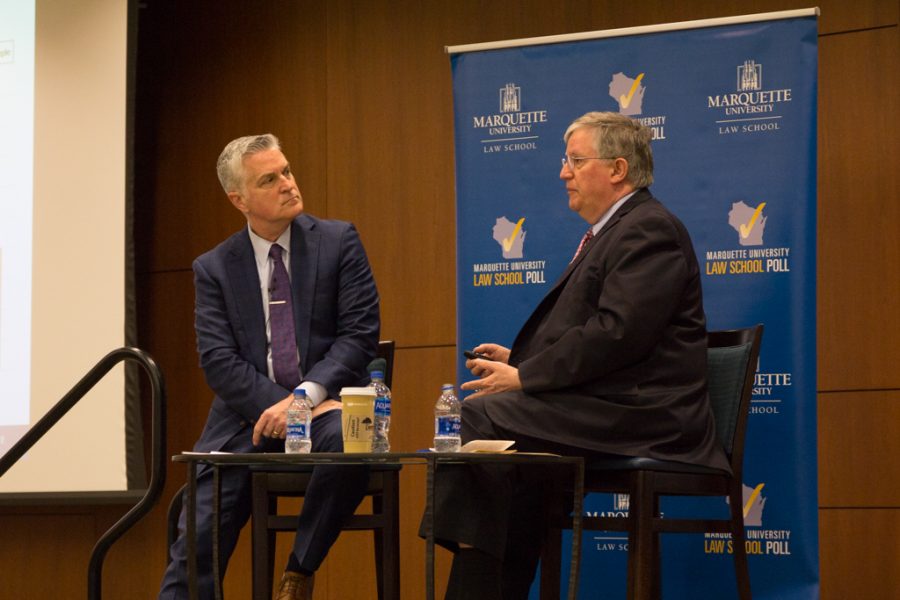 Wisconsin Attorney General J.B. Van Hollen discussed his interpretation of Wisconsin’s gun control regulations during a Tuesday lecture at Sensenbrenner Hall.
Wisconsin Attorney General J.B. Van Hollen discussed his interpretation of Wisconsin’s gun control regulations during a Tuesday lecture at Sensenbrenner Hall.
His visit to the Law School was hosted by Marquette’s chapter of the Federalist Society for Law and Public Policy Studies.
Van Hollen said openly carrying a firearm for personal protection is lawful, except while in school zones and government buildings, where possession of any weapon is illegal. This is a reiteration of a memorandum Van Hollen sent state district attorneys in April, which said, “the mere open carrying of a firearm by a person, absent additional facts and circumstances, should not result in a disorderly conduct charge from a prosecutor.”
An important part of regulating firearms is determining which regulations are constitutional, both nationally and in Wisconsin, Van Hollen said. In 2008, the United States Supreme Court deemed a District of Columbia handgun ban unconstitutional in District of Columbia v. Heller, but the court reaffirmed that the right to bear arms can be regulated.
Wisconsin amended its constitution in 1998, giving citizens the right to bear arms for security, defense, hunting, recreation and other lawful purposes. This right has its limits, however, as Wisconsin is one of only two states – Illinois is the other – with a blanket prohibition on the concealed carry of firearms, Van Hollen said.
Current firearm regulations in Wisconsin have multiple layers because of the state Supreme Court’s decisions in cases concerned with the concealed carry prohibition, he said.
Munir Hamdan, owner of Capitol Foods, 2483 W. Capitol Drive in Milwaukee, was arrested and convicted for breaking Wisconsin’s concealed carry law in 1999. He appealed the ruling, arguing he needed the weapon to protect his property, which is located in a high crime neighborhood. In 2003, the Wisconsin Supreme Court ruled Hamdan did not break the concealed carry statute and said individuals are allowed to carry concealed firearms to protect their homes or businesses, Van Hollen said.
However, in the 2006 case of Wisconsin v. Fisher, the court ruled it illegal for Scott Fisher, a tavern owner in Black River Falls, to carry a concealed weapon in his vehicle. Fisher contended he used his car to transport large amounts of cash from the tavern and needed the weapon for protection. The court ruled the concealed carry ban to be constitutional in this case because there was no immediate threat to Fisher like there was to Hamdan.
With these precedents set, the concealed carry ban became applicable to not only police, but also to shopkeepers and homeowners in high-crime areas where attacks have previously occurred, Van Hollen said.
Given the complications of gun control laws, including the legality of openly carrying a weapon, Van Hollen said he thinks police throughout the state are properly applying the laws.
The lecture was also intended to inform listeners on gun control litigation and precedent, said Matthew Fernholz, president of Marquette’s chapter of the Federalist Society.
“I hope people came away with a better understanding of Second Amendment legal issues, both nationally and within the state,” Fernholz said.




